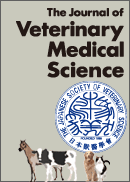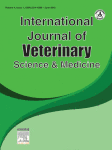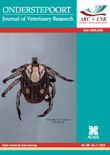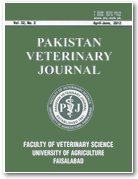
Open Veterinary Journal
Scope & Guideline
Unlocking Knowledge for the Future of Veterinary Practice
Introduction
Aims and Scopes
- Veterinary Pathology and Disease Management:
Research focusing on the diagnosis, treatment, and prevention of diseases in various animal species, including studies on infectious diseases, zoonotic diseases, and their management. - Clinical Veterinary Research:
Papers that examine clinical practices, surgical techniques, and innovative therapeutic approaches for treating animal health issues, including case reports and clinical trials. - Molecular and Microbiological Studies:
Investigations into the molecular characteristics of pathogens affecting animals, including antimicrobial resistance patterns and genetic studies related to infectious diseases. - Animal Welfare and Ethics:
Research addressing the well-being of animals in various settings, including transportation, farming, and companion animal care, as well as ethical considerations in veterinary practices. - Pharmacology and Toxicology:
Studies focusing on the effects of drugs, toxins, and therapeutic agents in animal health, including toxicity assessments and the efficacy of various treatments. - Zoonotic Diseases and Public Health:
Research that explores the interface between animal health and public health, particularly concerning zoonotic diseases that may affect humans.
Trending and Emerging
- Antimicrobial Resistance:
An increasing number of studies are addressing the critical issue of antimicrobial resistance in veterinary medicine, highlighting the need for new strategies and treatments to combat resistant pathogens. - One Health Approach:
Research integrating human, animal, and environmental health perspectives is gaining traction, emphasizing the interconnectedness of health issues across species and ecosystems. - Regenerative Medicine and Stem Cell Therapy:
There is a growing focus on regenerative medicine, particularly the use of stem cells and other advanced therapies to treat various conditions in animals. - Nutrition and Dietary Supplements:
Emerging studies are increasingly exploring the effects of nutrition and dietary supplements on animal health, performance, and disease prevention. - Veterinary Telemedicine:
The rise of veterinary telemedicine is being documented in research, reflecting changes in how veterinary care is delivered, particularly in response to the COVID-19 pandemic. - Behavioral Medicine and Animal Psychology:
There is a noticeable increase in research focused on animal behavior and psychology, particularly concerning stress management and behavioral interventions in clinical settings.
Declining or Waning
- Traditional Animal Husbandry Practices:
Research related to conventional animal management and husbandry techniques has decreased as modern, innovative practices and technologies gain attention. - Veterinary Education and Training:
While still relevant, papers focusing on the methodologies and effectiveness of veterinary education and training programs are appearing less frequently, possibly overshadowed by direct clinical and research contributions. - General Veterinary Microbiology:
General studies in veterinary microbiology are becoming less common, with a shift towards more specialized research focusing on specific pathogens and their impacts on animal health. - Historical Veterinary Practices:
Research examining historical veterinary practices is waning, as the field increasingly prioritizes contemporary issues and advancements in veterinary medicine.
Similar Journals

JOURNAL OF VETERINARY MEDICAL SCIENCE
Advancing Veterinary Knowledge for a Healthier Tomorrow.JOURNAL OF VETERINARY MEDICAL SCIENCE, published by the Japan Society of Veterinary Science, serves as a critical platform for advancing the field of veterinary medicine. With an ISSN of 0916-7250 and E-ISSN of 1347-7439, this journal covers a broad spectrum of topics relevant to veterinary science, publishing original research, reviews, and case studies that contribute to the scientific knowledge base and clinical practice. Recognized for its quality, the journal has achieved a Q2 ranking in the Veterinary (miscellaneous) category for 2023, placing it within the top 35% of journals in its field as per Scopus rankings. With a convergence of years spanning from 1991 to 2024, it reflects a rich history of scholarly contributions. Researchers, professionals, and students engaged in veterinary science will find valuable insights and advancements within its pages, significantly supporting their work and enhancing veterinary practices globally. The journal is located at the University of Tokyo, and while it does not currently offer open access, it remains an essential resource in veterinary medical literature.

BERLINER UND MUNCHENER TIERARZTLICHE WOCHENSCHRIFT
Exploring Innovations in Veterinary MedicineBERLINER UND MUNCHENER TIERARZTLICHE WOCHENSCHRIFT is an esteemed journal in the fields of Veterinary Science and Medicine, published by SCHLUETERSCHE VERLAGSGESELLSCHAFT MBH & CO KG. Since its inception in 1946, this journal has served as a vital platform for advancing knowledge and research in veterinary medicine within Germany and beyond. With a current impact factor that places it in the Q4 category in both Medicine and Veterinary, it continues to provide significant insights for professionals, researchers, and students engaged in the veterinary community. Although it is not an Open Access journal, its rich content contributes to the foundational literature of the field, making it an essential reference. Researchers looking to publish their findings or keep informed on the latest advancements in veterinary and medical practices will find this journal an invaluable resource. It is headquartered in Hannover, Germany, and serves as a testament to the ongoing dedication to veterinary research since the mid-20th century.

AMERICAN JOURNAL OF VETERINARY RESEARCH
Connecting Research and Clinical Practice in Veterinary MedicineAmerican Journal of Veterinary Research, published by the American Veterinary Medical Association, serves as a cornerstone of the veterinary medical community, providing essential insights from 1945 to the present. With an ISSN of 0002-9645 and E-ISSN of 1943-5681, this esteemed journal focuses on a diverse range of topics within the veterinary field, contributing to the advancement of veterinary science through rigorous peer-reviewed research. Ranking in the Q2 category in Veterinary (miscellaneous) and Q3 in Medicine (miscellaneous) category as of 2023, it holds a respectable position in Scopus rankings, further emphasizing its impact in the field. While currently not an Open Access journal, its objective remains clear: to disseminate cutting-edge research that informs clinical practice and enhances animal health and welfare. The American Journal of Veterinary Research is invaluable for researchers, professionals, and students seeking to stay at the forefront of veterinary advancements and innovations.

International Journal of Veterinary Science and Medicine
Elevating veterinary medicine with open-access insights.Welcome to the International Journal of Veterinary Science and Medicine, a leading platform for the dissemination of innovative research in the field of veterinary science. Published by TAYLOR & FRANCIS LTD, this esteemed journal has maintained an Open Access policy since 2013, ensuring widespread accessibility and engagement with cutting-edge veterinary studies. With an impressive impact factor and a Category Quartile ranking of Q1 in Veterinary (miscellaneous) as of 2023, it stands out as one of the top journals in its field, ranking #16 out of 194 in the Scopus Veterinary category, placing it in the 92nd percentile of academic publications. The journal encourages submissions of high-quality research and articles that contribute to advancements in veterinary medicine, ranging from clinical studies to public health implications. Located in the United Kingdom, the journal aims to foster collaboration and communication among veterinary professionals, researchers, and students, making it an indispensable resource for anyone involved in this vital field.

ONDERSTEPOORT JOURNAL OF VETERINARY RESEARCH
Bridging Gaps in Veterinary Knowledge for a Healthier FutureONDERSTEPOORT JOURNAL OF VETERINARY RESEARCH is a distinguished peer-reviewed journal published by AOSIS, dedicated to advancing the field of veterinary science since its inception in 1965. This open access journal, which transitioned to this model in 2003, is pivotal for researchers, professionals, and students interested in contemporary veterinary issues and innovations. With an impressive Scopus ranking of 25 out of 194 in the general veterinary category and a commendable 87th percentile, the journal has established itself as a vital resource in the veterinary community. The journal's commitment to fostering open scholarship and sharing crucial advancements ensures that research is accessible to a global audience, thereby enhancing collaboration and knowledge transfer across the veterinary sciences. The ONDERSTEPOORT JOURNAL OF VETERINARY RESEARCH serves not only as a platform for original research articles but also welcomes reviews, case studies, and communication pieces that inform and inspire the veterinary community.

Ankara Universitesi Veteriner Fakultesi Dergisi
Disseminating groundbreaking insights for animal welfare.Ankara Universitesi Veteriner Fakultesi Dergisi is a prominent academic journal published by ANKARA UNIV, focusing on advancements in veterinary sciences and animal biology. Since its inception, the journal has been committed to disseminating high-quality research, featuring articles that span a variety of topics within veterinary medicine and animal science. With an ISSN of 1300-0861 and an E-ISSN of 1308-2817, this journal provides valuable insights into the latest research developments and trends, making it a critical resource for researchers, professionals, and students in the field. The journal has established itself within the scholarly community, achieving a Q3 rank in Animal Science and Zoology and a Q2 rank in Veterinary (miscellaneous) as of 2023, reflecting its growing relevance and impact. Positioned in Turkey, it serves as a vital platform for both local and international scholars to share innovative findings and foster collaboration. Enhancing its accessibility, the journal's content is available through various academic databases, ensuring that its readership can effortlessly access and engage with cutting-edge research.

Revista Romana de Medicina Veterinara
Fostering collaboration for veterinary advancements.Revista Romana de Medicina Veterinara is a leading peer-reviewed journal dedicated to the field of veterinary medicine, published by the General Association of Romanian Veterinarians. With its ISSN 1220-3173 and E-ISSN 2457-7618, the journal aims to advance the domain of veterinary science through dissemination of high-quality research articles, case studies, and reviews that cover a wide array of topics including animal health, veterinary diagnostics, and treatment methodologies. Although primarily focused on the Romanian veterinary landscape, its scope is designed to engage a global audience of researchers, practitioners, and students seeking to enhance their knowledge and practice in veterinary medicine. The journal is committed to open accessibility, ensuring that vital research is readily available to the academic community without financial barriers, thereby encouraging collaboration and innovation. By providing a platform for cutting-edge veterinary research, Revista Romana de Medicina Veterinara plays a crucial role in fostering advancements that can significantly impact animal health and welfare both locally and internationally.

Journal of Veterinary Research
Elevating standards in veterinary science through open access.The Journal of Veterinary Research, published by SCIENDO, is a leading open-access journal dedicated to advancing the field of veterinary science. Established in Poland and accessible globally since 2012, this journal serves as a pivotal platform for researchers, professionals, and students, promoting the dissemination of high-quality research and innovative findings in veterinary medicine. With a robust impact factor reflective of its Q2 ranking in the Veterinary (miscellaneous) category for 2023, it ranks 54th out of 194 in the general veterinary field, placing it in the 72nd percentile among its peers. The Journal of Veterinary Research explores a wide variety of topics pertinent to veterinary practice, animal health, and research methodologies, making it an essential resource for academics and practitioners alike. Authors benefit from the journal's open-access model, which ensures their research is freely available to a broader audience, thus fostering collaboration and innovation within the veterinary community.

PAKISTAN VETERINARY JOURNAL
Transforming animal health through cutting-edge scholarship.Pakistan Veterinary Journal (ISSN: 0253-8318, E-ISSN: 2074-7764) is a leading peer-reviewed academic journal published by the University of Agriculture, Faculty of Veterinary Science, situated in Faisalabad, Pakistan. Since its inception, the journal has embraced an Open Access policy, facilitating the dissemination of vital research findings to a global audience and enhancing the visibility of veterinary science. With an impressive Q1 ranking in the veterinary miscellaneous category, the journal ranks #27 out of 194 in the veterinary general field according to Scopus, placing it in the top 14% of the discipline. The scope of the journal encompasses a wide array of topics relevant to veterinary medicine, ensuring that it serves as an essential resource for researchers, professionals, and students alike. By providing a platform for high-quality research from 2009 to 2024, the Pakistan Veterinary Journal continues to play a pivotal role in advancing veterinary science, promoting collaboration among scholars, and addressing contemporary challenges in animal health and welfare.

AUSTRAL JOURNAL OF VETERINARY SCIENCES
Fostering Excellence in Veterinary ScholarshipAUSTRAL JOURNAL OF VETERINARY SCIENCES is a prominent platform for innovative research in the field of veterinary science, published by UNIV AUSTRAL CHILE, FAC CIENCIAS VETERINARIAS. This journal, bearing the ISSN 0719-8000 and E-ISSN 0719-8132, serves as a vital resource for researchers, veterinarians, and students interested in advancing their knowledge in veterinary practices and animal health. With its influence reflected in its Q3 category ranking in the Veterinary (miscellaneous) field, and its Scopus rank of #95 out of 194, the journal highlights a robust commitment to disseminating valuable findings and insights. Between the years 2017 to 2024, it aims to provide open access to significant advancements and discussions in veterinary science, ensuring that vital research is accessible to a global audience. Located in Valdivia, Chile, the journal emphasizes its role in enhancing veterinary scholarship and fostering professional development within the community.